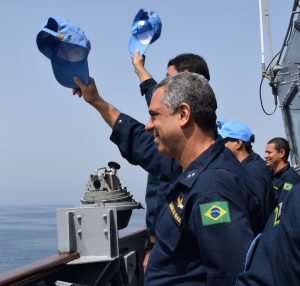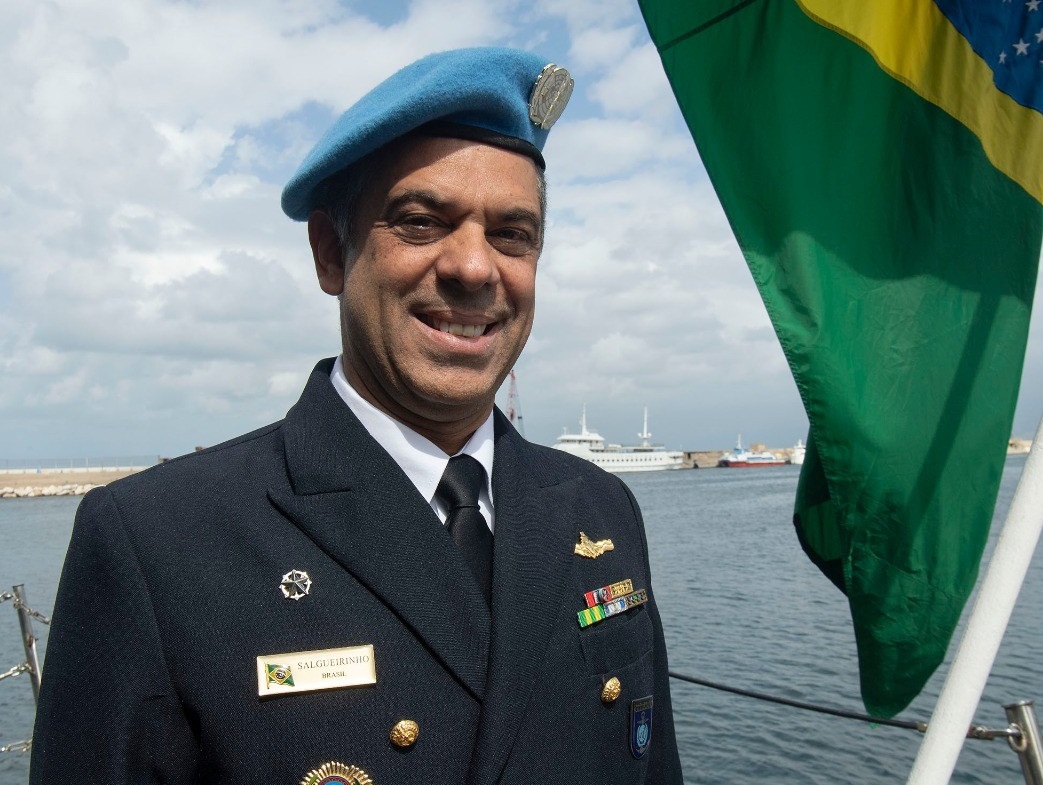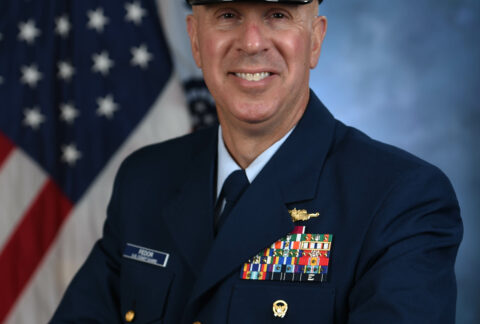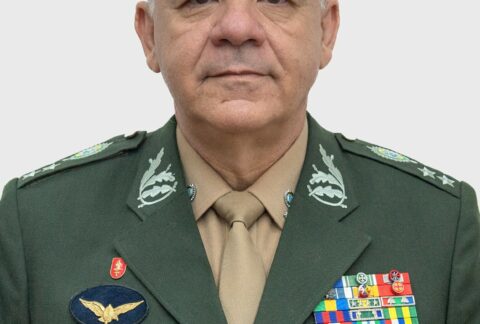In 1978, armed commandos of the Palestine Liberation Organization (PLO) attacked Israeli citizens, causing many deaths, and leaving many injured. In response to these criminal acts, the Israel Defense Forces invaded Lebanon to counterattack PLO strongholds, whose members were taking refuge and had operational bases in the southern part of the country. The situation posed a serious threat to the region’s peace and stability, and at the request of the Lebanese government, the United Nations Interim Force in Lebanon (UNIFIL) was created to guarantee the Israeli forces’ withdrawal from Lebanon, and assist the Lebanese government in restoring its authority in an area that armed groups and terrorists controlled until then.
In response to a new request from the Lebanese government, concerned that the use of its territorial waters for illegal activities may once again threaten its national security, and with the purpose of training its Navy, the U.N. established the UNIFIL Maritime Task Force (UNIFIL-MTF) in 2006. It is the first exclusively naval component of any peacekeeping mission.
In 2011, Brazil sent Brazilian Navy (MB, in Portuguese) Rear Admiral Luiz Henrique Caroli to Lebanon to lead this naval component. That same year, the frigate União arrived in Beirut. On February 29, 2020, MB Rear Admiral Eduardo Augusto Wieland transferred the command of UNIFIL-MTF to MB Rear Admiral Sergio Renato Berna Salgueirinho, who was UNIFIL-MTF’s last Brazilian commander. During its nearly 10 years of operation, Brazil led MTF’s Command and participated in the structure and force of the international operation, comprised of 15 countries. Now, service members from Bangladesh, Germany, Greece, Indonesia, and Turkey will be responsible for tasks at sea, with five ships and some 800 seamen. Brazil will continue to work with MTF, with some 16 service members through January 2021. Three MB service members will also participate and continue to manage other functions within the UNIFIL General Staff Command.

Diálogo spoke with Rear Adm. Salgueirinho about the main challenges faced during the UNIFIL-MTF mission, and other topics.
Diálogo: What were the main lessons learned during your mission in Lebanon?
Brazilian Navy Rear Admiral Sergio Renato Berna Salgueirinho: The multinational environment of any U.N. Peacekeeping Mission, in a task force comprised of different countries, means working side-by-side with seamen peacekeepers from all over the globe, from different cultures and religions. It is a unique opportunity for constant learning and absolute professional and personal enrichment.
In addition, the opportunity to interact with Lebanese people is also a highlight of this experience, which made it that much more special. Lastly, the complexity involved in the UNIFIL mission, located in a region of rich ancestral history, but also characterized by a recent history of conflicts and permanent instability, promotes invaluable lessons that become accumulated experience.
Diálogo: During your mission there were two uncommon and unprecedented occurrences: the COVID-19 pandemic and the tragic August 4, 2020 explosion at the Beirut Port that left more than 190 dead, many people missing, 6,500 wounded, and 300,000 homeless. How did you face these challenges?
Rear Adm. Salgueirinho: The consequences of the COVID-19 pandemic and the Beirut Port explosion have affected part of the availability of our forces and Lebanese forces. Despite the adversities caused by these situations, we observed that UNIFIL’s operational and tactical measures successfully neutralized and controlled the effects of these events without compromising the mission. Our ability to solve highly complex problems was put to the test, requiring quick analysis of the situation and efficiency for the correct decision-making process. We determined that the combination of efforts from the range of elements that make up UNIFIL was a decisive factor for achieving success. The competent, professional, and dedicated work performed by all peacekeepers involved, especially UNIFIL-MTF’s multinational General Staff and the crew of our ships, was outstanding.
Diálogo: What were the main challenges to interoperability with foreign navies within the context of an international peacekeeping operation?
Rear Adm. Salgueirinho: Throughout the years, Brazil learned how to manage UNIFIL-MTF member nations and this type of organization. At Task Force Command, we design processes that are constantly improving. After almost 10 years as UNIFIL-MTF commander, we have reached a high level of organization and efficiency, offering stability to carry out the mission. We can say that Brazil has grown in terms of training and gained invaluable experience in running an organization such as this. What we observed about the interoperability of foreign navies in combined operations was a pleasant surprise as we found a hospitable environment of great camaraderie and high naval spirit, as well as a highly professional level, not only with extreme capabilities, but equal among the members. Therefore, it could be said that in these almost 10 years, the MB gained vast experience in operation continuity during a real mission, in a multinational environment, located 5,500 nautical miles from its territory, in a region with a highly complex operational and geostrategic environment. The service members in the Brazilian contingent have always been very well received and treated well by all other members of troop-contributing countries in an environment of mutual respect and professionalism.
Diálogo: In addition to patrolling the Mediterranean Sea off the Lebanese coast, searching for ships suspected of arms smuggling, in what other missions did the MTF participate?
Rear Adm. Salgueirinho: Among the three main tasks of UNIFIL-MTF, the one concerning the illegal entry of weapons in Lebanon is to “conduct maritime surveillance in coordination with the Lebanese Navy and conduct Maritime Interdiction Operations (MIO) in support of the Lebanese Navy, to assist the Lebanese Armed Forces to prevent the illegal entry of weapons and related material into Lebanese territory from the sea.” Therefore, UNIFIL-MTF’s role is to assist Lebanese authorities. Additionally, when UNIFIL-MTF ships conduct ongoing patrols in the Mediterranean Sea, adjacent to Lebanese territory, they are contributing to the stability and peace in this region. In addition to this task, UNIFIL-MTF also provides tactical and operational training to the Lebanese Navy, contributing to the training of the Lebanese Armed Forces, enabling them to take on their independent responsibilities in the Lebanese territorial sea, at maritime borders, and points of entry. UNIFIL-MTF ships must be ready to participate in sea rescue operations. For instance, in September 2020, UNIFIL-MTF ships participated in such an operation in the Mediterranean Sea, rescuing 37 people and taking them to Lebanese territory, where they received medical assistance and other care, under the supervision of representatives of the United Nations High Commissioner for Refugees.
Diálogo: Why is the participation of Brazilian service members in a U.N. peacekeeping mission such as UNIFIL important?
Rear Adm. Salgueirinho: The Brazilian presence in UNIFIL has been aligned with the National Defense Strategy, which promotes greater influence and visibility for Brazil in the group of nations, reaffirming its commitment to protecting peace among people. The MB was also able to demonstrate its professional capacity for leadership and coordination, enabling the exchange of new operational and tactical knowledge with contingents from other countries. In this context, I would like to highlight the logistics challenges associated with maintaining a ship under intensive and continuous operation for over eight months, some 5,500 nautical miles away from its headquarters; the operational experience gained from operating in a multinational force; the visibility and projection of Brazil’s image on the international stage; the prestige and respect for the UNIFIL-MTF Command; the possibility of directly contributing to maintaining world peace, contributing to the safety and development of a friendly country, such as Lebanon; and directly contributing to the training of Lebanese Navy personnel to carry out activities aimed at maritime security in their territorial sea.









